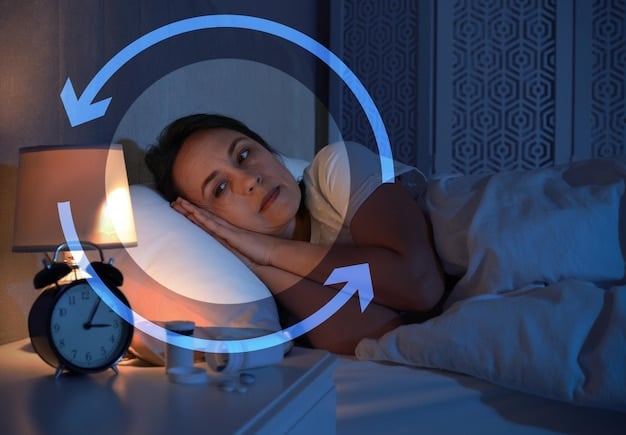The Ultimate Guide to Sleep Hygiene: Improve Your Sleep Quality by 50% in 3 Weeks

The Ultimate Guide to Sleep Hygiene: Improve Your Sleep Quality by 50% in 3 Weeks offers actionable strategies to enhance sleep quality through simple lifestyle adjustments, creating a restful and rejuvenating sleep environment, and implementing consistent routines.
Are you struggling to get a good night’s sleep? Do you wake up feeling tired and groggy, even after sleeping for hours? If so, you might need to improve your sleep hygiene. The Ultimate Guide to Sleep Hygiene: Improve Your Sleep Quality by 50% in 3 Weeks is here to help you reclaim your sleep and wake up feeling refreshed and energized and learn practical tips to improve sleep quality.
Good sleep hygiene involves creating a sleep-conducive environment and developing habits that promote consistent, restful sleep. Following The Ultimate Guide to Sleep Hygiene: Improve Your Sleep Quality by 50% in 3 Weeks can transform your nights, turning restless tossing into peaceful slumber.
Understanding The Importance of Sleep Hygiene
Sleep hygiene is a set of practices and habits necessary to have normal, quality nighttime sleep and full daytime alertness. Proper sleep hygiene involves optimizing your sleep environment and daily routines to help you fall asleep faster, stay asleep longer, and wake up feeling refreshed.
Why is Good Sleep Hygiene Crucial?
Good sleep hygiene is essential for overall health and well-being. Insufficient or poor-quality sleep can lead to a variety of negative health outcomes, including decreased cognitive function, mood disturbances, weakened immune system, and increased risk of chronic diseases.
- Improved Cognitive Function: Adequate sleep is vital for memory consolidation, learning, and overall cognitive performance.
- Enhanced Mood: Quality sleep helps regulate mood and reduces the risk of depression and anxiety.
- Better Physical Health: Good sleep supports a strong immune system and reduces the risk of chronic diseases like diabetes and heart disease.
- Increased Productivity: Restful sleep leads to greater alertness and productivity during the day.
Improving your sleep hygiene is a proactive step toward improving your overall quality of life. When you prioritize healthy sleep habits, you enhance your physical health and mental well-being. Following The Ultimate Guide to Sleep Hygiene: Improve Your Sleep Quality by 50% in 3 Weeks, you’ll not only sleep better, but also experience significant improvements in your daily life.

Creating a Sleep-Friendly Environment
One of the most important aspects of sleep hygiene is creating a sleep-friendly environment. Your bedroom should be a sanctuary that promotes relaxation and restful sleep. This involves optimizing various factors, such as temperature, lighting, and noise levels.
Optimizing Your Bedroom
A well-optimized bedroom can significantly improve your sleep quality. Consider the following factors:
- Temperature: Keep your bedroom cool, ideally between 60-67°F (15-19°C). A cooler temperature helps regulate your body’s internal clock and promotes sleep.
- Lighting: Ensure your bedroom is dark. Use blackout curtains or blinds to block out external light. Darkness triggers the release of melatonin, a hormone that promotes sleep.
- Noise: Minimize noise in your bedroom. Use earplugs, a white noise machine, or a fan to mask disruptive sounds.
- Comfort: Invest in a comfortable mattress, pillows, and bedding. Choose materials that are breathable and supportive to ensure a comfortable sleep surface.
Creating a sleep-friendly environment is crucial, but also maintaining consistency. The Ultimate Guide to Sleep Hygiene: Improve Your Sleep Quality by 50% in 3 Weeks can help you identify and address environmental factors that may be disrupting your sleep.
Establishing a Consistent Sleep Schedule
Maintaining a consistent sleep schedule is a cornerstone of good sleep hygiene. Going to bed and waking up around the same time every day, even on weekends, helps regulate your body’s internal clock, also known as the circadian rhythm. This consistency promotes better sleep quality and daytime alertness.
The Benefits of a Regular Sleep Schedule
A consistent sleep schedule offers numerous benefits:
- Regulated Circadian Rhythm: Consistency helps synchronize your body’s natural sleep-wake cycle.
- Improved Sleep Quality: A regular schedule promotes deeper, more restful sleep.
- Increased Daytime Alertness: Waking up at the same time each day can improve your energy levels and cognitive function.
- Easier to Fall Asleep: Establishing a routine makes it easier to fall asleep and wake up naturally.
If you choose to implement The Ultimate Guide to Sleep Hygiene: Improve Your Sleep Quality by 50% in 3 Weeks, consider this the most important step. It can be challenging to adjust your sleep schedule initially. Once established, it is important to maintain the schedule even on weekends, adjust gradually, and seek professional help if needed to ensure that your sleep schedule contributes positively to your overall well-being.

Optimizing Your Daytime Habits
Your daytime habits can significantly impact your sleep quality. What you do during the day, from your diet to your exercise routine, can either promote or disrupt your sleep. By making conscious choices throughout the day, you can improve your sleep hygiene and enjoy more restful nights.
Dietary Considerations for Better Sleep
Your diet plays a crucial role in regulating your sleep patterns. Consider the following dietary tips:
- Limit Caffeine and Alcohol: Avoid caffeine and alcohol, especially in the evening. These substances can interfere with your sleep cycle and prevent you from falling asleep or staying asleep.
- Avoid Heavy Meals Before Bed: Eating large meals close to bedtime can disrupt your sleep. Opt for a light snack if you’re hungry.
- Stay Hydrated: Drink plenty of water throughout the day, but avoid excessive fluid intake before bed to reduce nighttime awakenings.
The Impact of Exercise on Sleep
Regular physical activity can improve sleep quality, but timing is key:
- Exercise Regularly: Engage in regular exercise, but avoid intense workouts close to bedtime.
- Time Your Workouts: Aim to finish your workouts at least a few hours before you go to bed.
- Morning Exercise: Consider exercising in the morning to help regulate your circadian rhythm and promote daytime alertness.
Optimizing your daytime habits is an integral part of The Ultimate Guide to Sleep Hygiene: Improve Your Sleep Quality by 50% in 3 Weeks. By making mindful choices about your diet and exercise routine, you’ll not only sleep better, but also experience improvements in your overall health and well-being.
Relaxation Techniques for Better Sleep
Stress and anxiety can significantly interfere with your ability to fall asleep and stay asleep. Incorporating relaxation techniques into your bedtime routine can help calm your mind and prepare your body for sleep. These techniques can promote relaxation and reduce mental clutter.
Effective Relaxation Techniques
Here are some effective relaxation techniques to improve sleep:
- Meditation: Practice mindfulness meditation or guided meditation to calm your mind and reduce stress.
- Deep Breathing Exercises: Engage in deep breathing exercises to slow your heart rate and promote relaxation.
- Progressive Muscle Relaxation: Tense and release different muscle groups to relieve physical tension.
- Reading: Read a book or listen to a calming audiobook to distract your mind from daily stressors.
Practicing relaxation techniques is a crucial part of The Ultimate Guide to Sleep Hygiene: Improve Your Sleep Quality by 50% in 3 Weeks. These techniques not only improve sleep quality but also contribute to overall stress management and mental well-being. By consistently incorporating these practices, you can create a more peaceful and restful sleep experience, leading to a more refreshed and energized life.
Addressing Common Sleep Disruptors
Despite your best efforts to practice good sleep hygiene, various factors can still disrupt your sleep. Identifying and addressing common sleep disruptors is essential for maintaining consistent, quality sleep. These disruptors can range from environmental factors to underlying health conditions, and addressing them can significantly improve your sleep experience.
Managing Sleep Disruptors
Common sleep disruptors and how to handle them:
- Screen Time Before Bed: Avoid using electronic devices before bed. The blue light emitted from screens can interfere with melatonin production.
- Late-Night Snacking: Refrain from eating heavy meals or sugary snacks before bed, as they can lead to digestive discomfort and sleep disruption.
- Stress and Anxiety: Practice stress-reduction techniques, such as meditation or deep breathing exercises, to calm your mind before bed.
- Underlying Health Conditions: Consult with a healthcare professional if you suspect an underlying health condition is affecting your sleep.
Addressing common sleep disruptors is a vital part of The Ultimate Guide to Sleep Hygiene: Improve Your Sleep Quality by 50% in 3 Weeks. By identifying and managing these factors, you can create a more conducive sleep environment and improve the consistency and quality of your sleep.
| Key Point | Brief Description |
|---|---|
| 🌙 Consistent Sleep Schedule | Regulate your body clock by sleeping and waking up at the same time daily. |
| 🛏️ Sleep Environment | Ensure your bedroom is dark, quiet, and cool for optimal sleep. |
| ⏰ Daytime Habits | Avoid caffeine and heavy meals before bed; exercise regularly. |
| 🧘 Relaxation Techniques | Incorporate meditation or deep breathing to calm your mind before sleep. |
Frequently Asked Questions (FAQs)
Sleep hygiene refers to the practices and habits that are necessary for achieving normal, quality nighttime sleep and maintaining full daytime alertness. It focuses on optimizing your sleep environment and daily routines.
It’s recommended to stop using electronic devices at least one to two hours before bedtime. The blue light emitted from screens can suppress the production of melatonin, making it harder to fall asleep.
Yes, by consistently implementing the strategies of good sleep hygiene, such as maintaining a consistent sleep schedule, optimizing your sleep environment, and practicing relaxation techniques, you can significantly improve your sleep.
If you can’t fall asleep after lying in bed for 20 minutes, get out of bed and do a relaxing activity, such as reading or listening to calming music, until you feel tired. Then, return to bed and try to fall asleep again.
Yes, avoid caffeine, alcohol, and heavy meals close to bedtime. These substances can interfere with your sleep cycle. Opt for a light snack if you’re hungry, and stay hydrated but avoid excessive fluid intake before bed.
Conclusion
In conclusion, mastering sleep hygiene is a holistic approach to improving sleep quality and overall well-being. The Ultimate Guide to Sleep Hygiene: Improve Your Sleep Quality by 50% in 3 Weeks empowers you to create a sleep environment that promotes restful nights and energized days.
By consistently implementing these strategies, you can transform your sleep patterns and experience significant improvements in your daily life. Embrace these practices and unlock the secret to a healthier, more rested you.





